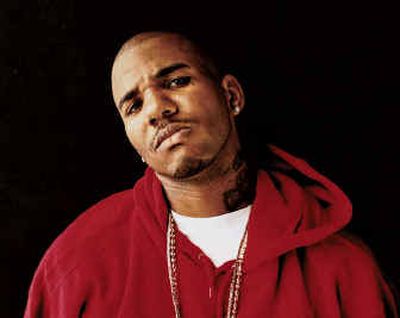Musician/businessman

Myth-making can be as important as musicianship in the gangster rap world.
Tupac Shakur was known as the thoughtful son of a Black Panther activist. Eazy-E was a hustler who once sold tapes out of the trunk of his car.
And so The Game, who carefully studied their careers, introduces himself with this tale:
Raised largely in foster care and beat up daily when he wore Blood red to Crip-dominated Compton High School, he still managed to nab a basketball scholarship to the University of Washington – only to be kicked out for selling drugs on campus.
Uninterested in music at the time, he turned to stealing cars and other crimes back in California, but was shot five times in 2001 when thieves invaded his drug-selling spot. Twenty-three hours later, he says, “I woke up from a coma and I had the gift of rap.”
Appearances on underground mix tapes rapidly led to a deal with super-producer Dr. Dre, who has tutored The Game and overseen his debut, “The Documentary,” which debuted at No. 1 on this week’s Billboard album chart.
A collaboration with 50 Cent, “How We Do,” is No. 6 on the singles chart. Another song, “Westside Story,” gives the short version of Game’s life: “Sold crack, got jacked. Got shot, came back, jumped on Dre’s back. Payback! Homie, I’m bringing C-A back.”
The C-A in question is California, where the seminal gangster rap scene has slumped in popularity recently as Dre looked elsewhere for talent (finding Eminem in Detroit and 50 Cent in New York) while pioneers like Ice Cube eased out of music.
The calculating, heavily tattooed 25-year-old Game – always ready with a snarl for videos and publicity photos – says he pieced together his style and persona by listening to Cube’s “AmeriKKKa’s Most Wanted,” Tupac’s “All Eyez On Me” and other rap landmarks.
“I tried to take everybody who I thought was legendary who I thought had classic material and combine ‘em all,” he says.
“I took Jay-Z’s cockiness and his swagger, I took ‘Pac’s ambition and his work ethic. I took (Notorious) B.I.G.’s wordplay and his metaphorical climate, I took Snoop Dogg’s gang-banging and California lifestyle. I took Kool G Rap and Ice Cube and their flow.”
But Game, whose real name is Jayceon Taylor, doesn’t even think of himself as primarily a musician.
“I consider myself to be a businessman,” he says. “Doing music is a branch on the tree. The other branches are filmmaking and endorsements.”
A Reebok sneaker deal is in the works, as is a movie, “Millionaire Boys Club.” Michael K. Williams (Omar from HBO’s “The Wire”) and Shari Headley (“Coming to America”) star alongside Game in the gangster tale and love story he describes as “a cross between ‘Menace II Society’ and ‘Love Jones.’ “
Next up, the 6-foot-4 rapper – nicknamed by his grandmother for being “game” to try anything as a child – is trying to get back into basketball. As with his rap career, there are no plans to start small: He’s aiming for a 10-day NBA contract.
“You ask anybody about my game, you’ll see,” he says.
In the beef-obsessed rap world, he’s been just as outspoken – taking shots and winning lyrical battles against New Yorker Joe Budden and the Bay Area’s Yukmouth.
What Game won’t do is turn on Dre. He slows down and drops his voice when speaking of the legendary producer, whom he idolized along with other members of the pioneering Compton-based group N.W.A. When he was 10, he watched group members hand out gifts in his neighborhood and talk about his community on television.
Now, having moved to a condominium in Beverly Hills, Game considers Dre both a musical mentor and a life-saver, for pulling him out of his dangerous Compton life with a recording contract.
“He brings the best outta me. I owe everything to Dre,” he says. “If it wasn’t for Dre, I’d probably be dead right now.”